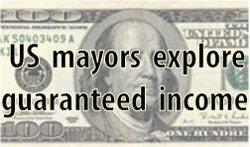
 |
Mayors explore guaranteed income |
|
FRONT PAGE About us   ON OTHER PAGES Post-Covid, American cities strengthen economic equity, resilience and regionalism Mayors explore guaranteed income targeted at low-income Americans An American Dream for the 21st century American mayors: Moral values in politics Public health and racism in the US City Equity Offices to counter systematic racism in America List of US City Equity Offices African American Mayors Ending racism in American cities - a conversation with Rochester's (NY) first black mayor Police killings of Black Americans The strengths and weaknesses of US cities during a pandemic US local government structures US mayors (2020) US cities and Covid-19: Six pages of research & tables COVID-19 hits African Americans hardest World's capital cities and their mayors (2020) |
 “Guaranteed income is a clear path “Guaranteed income is a clear pathtoward economic and racial justice” February 2021: In 2019 Stockton, California, became the first US city to implement a guaranteed income program, moving an idea that was essentially theoretical in America to practice. Stockton’s former Mayor Michael Tubbs, who launched the program, explained, “We need a social safety net that goes beyond conditional benefits tied to employment, works for everyone and begins to address the call for racial and economic justice through a guaranteed income.” Other US cities have begun small-scale guaranteed income pilot programs or are considering such programs. These programs not only challenge current social assistance practices but also promise to rewrite the social contract in America. Rationale for guaranteed income A guaranteed income program delivers cash with no conditions. Traditional social assistance programs in the US stipulate how much recipients can spend, where they can spend it, and what they can buy. Guaranteed income programs have no such strings attached. Recipients decide how to spend the money they receive. In the US, these programs are generally targeted to low-income individuals and families. US mayors describe their reasons for supporting a guaranteed income: Stockton, California Mayor Michael Tubbs: “I recognized that there’s a need for additional income, especially with the pandemic resulting in record high numbers of unemployment throughout the entire country.” Compton, California, Mayor Aja Brown: “This is a great opportunity to address inequalities for Black and Brown people and also additional opportunities for upward mobility.” Madison, Wisconsin, Mayor Satya Rhodes-Conway: “Because affordable housing is such a critical issue in the City of Madison, my staff is exploring how we can design and implement a [guaranteed income] pilot that places housing affordability and security at the center of this conversation.” Los Angeles, California, Mayor Eric Garcetti: “Offering direct aid to struggling families translates into greater security for our economy, stability for our communities, and peace of mind for households across our cities.” Saint Paul, Minnesota, Mayor Melvin Carter: “Guaranteed income is a clear path toward economic and racial justice for Americans.” The mayors’ words capture two distinct but intimately related rationale for guaranteeing incomes: economic security and social justice. Economic benefits of guaranteed income programs include mitigating the effects of job losses from the pandemic and other causes, such as automation. Guaranteed income programs may also help stabilize communities (i.e., rental markets, neighborhood commercial areas, school enrollment) and avoid public health, public safety, and other costs to taxpayers resulting from desperate and often illegal actions taken out of economic hardship. They could also help the economy by reducing the number of people who are not in the labor supply because employment leads to a reduction in benefits. Overall, they can help create individual and household wealth to break the cycle of poverty. Social justice benefits include eliminating the stigma often attached to social assistance programs, as well as the contentious issue of exclusion and inclusion errors which are inherent in current public programs. Redirecting public revenues directly to citizens could be empowering, not only economically, but also psychologically by reducing stress and trauma and increasing self-esteem and peace of mind for individuals and households. Guaranteed income programs can also be targeted to address such issues as gender and housing equity. Current programs Stockton, California (population 309,000). In 2019, then Mayor Michael Tubbs launched the Stockton Economic Empowerment Demonstration, which gave 125 randomly-selected low income residents $500 a month for 18 months. In 2020, several US mayors implemented or committed to implement guaranteed income pilot programs in their cities, including: Compton, California (population 97,000). Mayor Aja Brown launched America’s largest guaranteed income program, the Compton Pledge, to give 800 residents free cash for a two-year period. Families are randomly selected from a “pre-verified” group of low-income residents. Each selected family receives at least a few hundred dollars on a recurring basis, as well as tools that will help them access financial guidance. The program aims to include a representative sample of the 68 percent of Latino and 30 percent of Black residents in Compton, as well as those often excluded from federal and state assistance programs, including undocumented immigrants and formerly incarcerated residents. Saint Paul, Minnesota (population 305,000). Mayor Melvin Carter launched the People’s Prosperity Guaranteed Income Pilot, which provides up to 150 families with $500 per month in guaranteed income for up to 18 months. Richmond, Virginia (population 227,000). Mayor Levar Stoney launched the Richmond Resilience Initiative, which provides 18 working families who do not make a living wage but still do not qualify for public assistance with $500 per month for 24 months. Pittsburgh, Pennsylvania (population 302,000). Mayor Bill Peduto announced the Assured Cash Experiment, which will provide 200 residents with $500 per month for 24 months. Half the funds will be dedicated to households run by Black women. Columbia, South Carolina (population 133,000). Mayor Stephen Benjamin announced the Columbia Life Improvement Monetary Boost initiative, which will provide 100 Black fathers with $500 per month for 24 months. Funds will be managed through a local nonprofit foundation. Hudson, New York (population 6,200). Mayor Kamal Johnson launched a guaranteed income pilot in late 2020, providing 25 residents with $500 each month for five years. Much of the funding to launch several of these pilots came from Mayors for a Guaranteed Income, founded in 2020 by Stockton Mayor Michael Tubbs. Eleven US mayors initially joined the network after committing to explore a guaranteed income program for their cities; membership has since grown to 36 US mayors. Mayors for a Guaranteed Income relies on private funds. Other sources of financing for current guaranteed income pilot programs include federal pandemic stimulus funds, municipal revenues, and local private and nonprofit donors. Monitoring and evaluation No two guaranteed income pilot programs in the US are identical. Indeed, design flexibility to meet local needs is a major rationale for the programs. The mayors who implemented the programs are aware of the strong ideological forces and vastly different expectations in America regarding economic and social equity. All recognize the need for an evidence-based approach. Most programs utilize independent researchers to track recipients’ spending and well-being. Mayors for a Guaranteed Income, which helps finance many of the current pilot programs, tracks and disseminates best practices and provides a forum for member mayors, communities, and their partners to discuss goals, challenges, and lessons learned. Conclusion Local guaranteed income programs, like other local public assistance programs, are strongly linked to changes in the national political economy. Yet, they have the potential to change how Americans think about who merits social assistance, fairness in the way such programs are delivered, power relations in labor markets, racial equity, gender equity, housing equity, and other challenging and often contentious issues. Los Angeles Mayor Garzetti calls guaranteed income, “a new way of lifting up folks hard-hit by the short-term pain of the pandemic or the long-term consequences from structural and institutional inequalities.” Former Mayor Tubbs says that current pilots are “shaping what the social contract looks like in America.” Selected references Gentilini, U., Grosh, M., Rigolini, J., Yemtsov, R. Exploring Universal Basic Income: A Guide to Navigating Concepts, Evidence, and Practices. Washington, DC: World Bank, 2020. Link . Mayors For A Guaranteed Income. Mayors For A Guaranteed Income Receives $15 Million Grant from Jack Dorsey: New funding helps launch guaranteed income programs helmed by member mayors in 25+ U.S. cities. News Release. December 8, 2020. Link Alejandra Reyes-Velarde. 800 Compton residents to get guaranteed income in two-year pilot program. Los Angeles Times, October 18, 2020. Link © Copyright: City Mayors Foundation. All rights reserved Follow @City_Mayors |